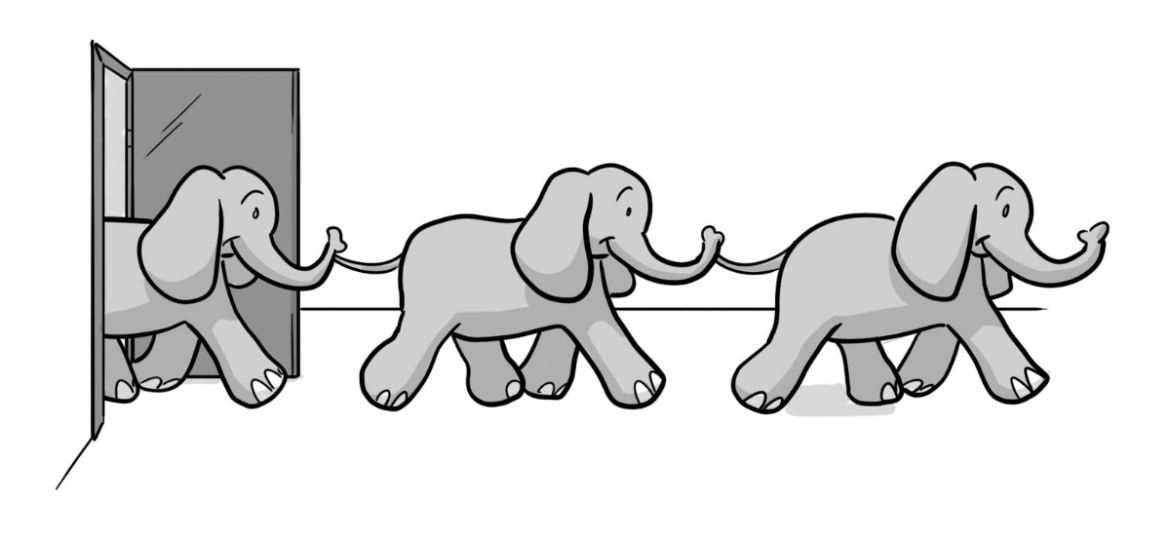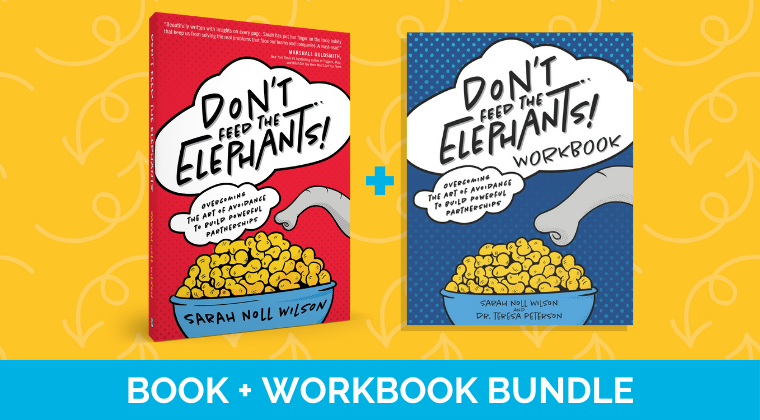
by Sarah Noll Wilson
I wrote Don’t Feed the Elephants: Overcoming the Art of Avoidance to Build Powerful Partnerships, three years ago. Two years ago, it was published. And just this week, we released the Don’t Feed the Elephants! Workbook, a stand-alone companion that provides actionable strategies and prompts for reflection for anyone—leaders, team members, partners, parents, siblings, volunteers, or anyone who wants to improve the quality of their conversations.
Long story short: whew, a lot of elephants. A lot of thinking about elephants, writing about elephants, and discovering as we go. I’m so grateful to do this work of freeing elephants because underneath that act is where connection and growth can happen.
But just like freeing elephants is an evolving and ongoing process, so is learning more about avoidance—its causes, its consequences, and everything in between.
Here are three things we’ve learned about elephants, three years after writing the first book:
Avoidance is not one-size-fits-all
When I first wrote the book, I observed avoidance as being largely driven by fear. That was my experience, and I assumed it was the main driver. But I’ve since seen there’s another layer of avoidance, which I think of as “aggressive avoidance.” In these situations, people are behaving in ways that aim to hold “power over” others—whether by manipulating a situation, demeaning someone, or minimizing the other person in a way that feels like an attack rather than just avoidance.
Some of the examples we’ve seen from readers include what I now call the gaslightephant—when someone tries to make you question your reality to avoid an honest conversation. Or the grenadephant—when someone throws a figurative bomb into a conversation and then disengages, leaving others to pick up the pieces.
These behaviors reveal that avoidance isn’t a monolith; it has its shades and intentions. This realization has reshaped how I approach freeing elephants because it reminds me that every elephant is as complex as the dynamics around it.
Power dynamics play a huge role
I can’t talk about freeing elephants now without addressing power. Formal power dynamics—the title someone holds, their authority, their influence—undeniably impact how safe or risky it feels to address avoidance. Sometimes, a person with authority has longstanding, familiar relationships with certain people that can shift the room’s power balance and shape how and when conversations happen.
And let’s not forget about informal power which also has a significant, sometimes invisible, influence on whether people feel free to speak up. These dynamics are often shaped by our identities—who we are, how we’re seen, and the history we carry. For example, someone from an underrepresented group or a newcomer to a team might feel that raising a concern risks being labeled “difficult” or “sensitive.” When someone is already in a position where they’re working against stereotypes, the stakes of addressing an elephant feel even higher. In these situations, speaking up is not just about the issue itself but about navigating risks tied to who they are.
Understanding this is crucial for leaders. Creating safer spaces for honest conversations means recognizing these nuances, listening with awareness, and building trust—so people can bring forward what’s weighing on them without the added cost of navigating identity-based risks.
Repair matters
One of my biggest realizations this year has been just how critical it is to repair the moments that miss the mark. We all have those regrettable moments—the times we say the wrong thing, act out of turn, or simply fail to show up the way we intended. And while it can feel easier to move on or hope the other person will forget, these little moments have a way of accumulating, slowly eroding trust until the distance between us feels bigger than it should.
The truth is, repairing these moments is a skill—a skill most of us have to learn. It takes intention to recognize when something’s been off and to genuinely address it, whether it’s offering an apology or simply acknowledging, “I didn’t handle that well.” This work of repair can be uncomfortable, but the impact on our relationships is undeniable. Repairing not only restores trust but also strengthens our ability to be open and vulnerable with each other in the future.
As I continue my own journey in freeing elephants, I’m committed to working on how I show up for these moments of repair. I aim to acknowledge them, thank people when they share hard feedback, and stay curious about how I can show up better next time. Because when we lean into repair, we open up a pathway back to connection, and that’s where the real growth happens.
Why does repair matter so much? Because in my own journey, I’ve noticed those “small” moments that seem inconsequential but end up eroding trust over time. It’s that death by a thousand cuts, and it can widen the space between people until the distance feels insurmountable. And in those moments the thread of trust begins to fray.
Marching Onward
When I started this journey in 2008, I didn’t fully grasp the impact that freeing elephants could have on relationships, teams, and culture. I only knew I didn’t like how avoidance felt, whether I was witnessing it, being on the receiving end, or avoiding myself. I knew what was possible from literature, but never experienced it directly. Over the past decade of making the conscious effort to “walk the talk”—with my team, family, close friends and helping our clients do the same, I see now that even more is possible than I first imagined.
Life is just better on the other side of having curious, candid, and compassionate conversations. Even when they are uncomfortable, they are valuable.
Reflection Questions
- If you’ve been practicing along with us, what have you discovered about freeing elephants in your own relationships?
- How has your thinking evolved on how to address avoidance?
- What questions do you have that we could explore together in this journey?
Sarah Noll Wilson is on a mission to help leaders build and rebuild teams. She aims to empower leaders to understand and honor the beautiful complexity of the humans they serve. Through her work as an Executive Coach, an in-demand Keynote Speaker, Researcher, Contributor to Harvard Business Review, and Bestselling Author of “Don’t Feed the Elephants”, Sarah helps leaders close the gap between what they intend to do and the actual impact they make. She hosts the podcast “Conversations on Conversations”, is certified in Co-Active Coaching and Conversational Intelligence, and is a frequent guest lecturer at universities. In addition to her work with organizations, Sarah is a passionate advocate for mental health.



